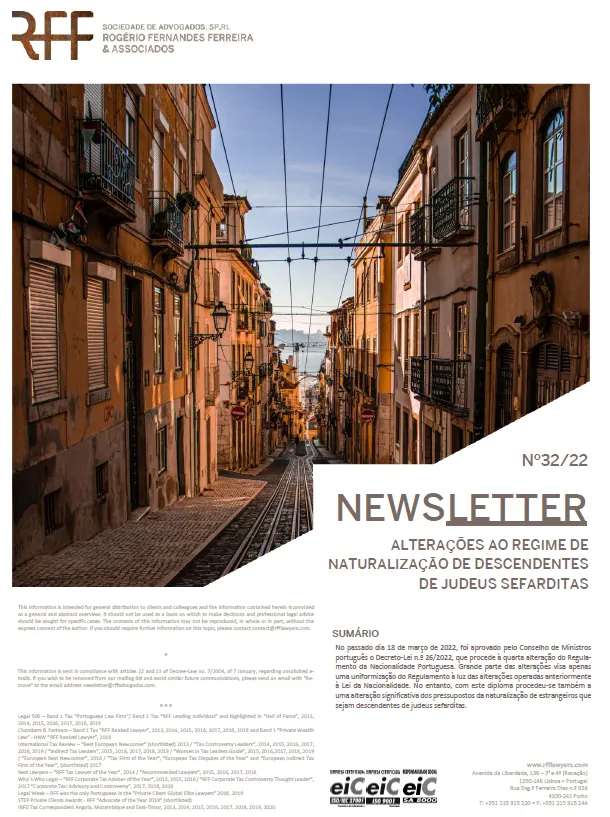Amendments to the naturalization regime for descendants of Sephardic Jews

Amendments to the naturalization regime for descendants of Sephardic Jews
SUMMARY
On March 18, 2022, the Portuguese Council of Ministers approved the Decree-Law n. º 26/2022, which proceeds with the fourth amendment to the Portuguese Nationality Regulation. Most of the changes are only aimed at standardizing the Regulation in light of amendments previously made to the Nationality Law. However, this Decree-Law also changed the requirements for naturalization of foreigners who are descendants of Sephardic Jews.
INTRODUCTION
On March 18, 2022, the Portuguese Council of Ministers approved the Decree-Law n. º 26/2022, which proceeds with the fourth amendment to the Portuguese Nationality Regulation. Most of the changes are only aimed at standardizing the Regulation in light of amendments previously made to the Nationality Law. However, this Decree-Law also changed the requirements for naturalization of foreigners who are descendants of Sephardic Jews.
It should be noted that although most of the provisions contained in Decree-Law no. 26/2022 come into force on 15 April 2022, this is not the case with regard to the alterations concerning the naturalization process for descendants of Sephardic Jews. Therefore, the changes referred to in this article, concerning the naturalization of Sephardic Jews’ descendants, will only come into effect on September 1, 2022. Until that date, the previous provisions of the Regulation will remain in effect.
MAIN CHANGES
The main change introduced is related to the requirement of demonstration, based on objective requirements, of the existence of a present connection to Portugal, which can be demonstrated by proving one of the following facts:
i. Ownership, transmitted mortis causa (by inheritance), of real estate(s) located in Portugal, other personal rights or shareholdings in commercial or cooperative companies based in Portugal; and/or
ii. Regular visits to the Portuguese territory.
Another change made by the above-mentioned Decree-Law is related to the need for linguistic clarification of article 24-A, no. 5 of the Regulation, concerning the procedure for a Jewish Community, with the status of a religious corporate body, to issue a certificate attesting the membership of an applicant to a Sephardic community of Portuguese origin. Reading this amended legal document, it is now clear that, not only in the absence of a certificate issued by the Jewish Community, but also in order to issue this certificate, it is necessary to provide the Jewish Community (in order to issue the certificate) or the Central Registry Office (if the certificate is not previously issued) with documentation proving the applicant's descent from a Sephardic community of Portuguese origin, the tradition of belonging to that community and the applicant's family line, namely through:
i. Authenticated document issued by the Jewish Community to which the applicant belongs, certifying, in a substantiated manner, the use of Portuguese expressions in Jewish rites or the use of Ladin as the language spoken by the applicant within that community; and/or
ii. Authentic documentary records, such as synagogue and Jewish cemetery registers, as well as residence titles, property titles, testaments or genealogical studies proving the applicant's family connection by direct descent or collateral family relationship of a common parent from the Sephardic community of Portuguese origin.
Although, in practice, this is not a real procedural alteration, since the Portuguese Jewish and Israeli communities already required these documents - correctly applying, in our view, the rule already in force at the time -, this legislative alteration brings greater linguistic clarity to the rule and, thus, greater certainty in its application.
OTHER CHANGES ON THIS REGIME
The remaining amendments demonstrate, in some cases, an intention of linguistic refinement, for greater certainty in its application, and, in other cases, the need for a better procedural organization and guarantee of conservation of documentation by the Central Registry Office and the Jewish or Israeli Communities involved in the process.
In this regard, it should be noted that the Portuguese Jewish or Israeli Communities now assume the role of trustees of the documents delivered to them by the applicant, for a period of 20 years, and should always digitalize and send them to the Central Registry Office, which, in turn, may require the delivery of these documents in their original version if it considers that there is a risk of damaging.
CONCLUSION
Thus, from the applicant's point of view, these amendments seem particularly relevant, since it will now be necessary to prove, in addition to the descendance, a connection to Portugal, based on objective requirements, such as ownership of real estate situated in Portuguese territory or regular visits to Portugal.
With these changes, the naturalization procedure will become more restrictive and it is expected to be a serious obstacle for many descendants of Sephardic Jews of Portuguese origin who intend to obtain Portuguese nationality.
Lisbon, 19 August 2022
Rogério M. Fernandes Ferreira
Duarte Ornelas Monteiro
Joana Marques Alves
Ricardo Miguel Martins
Marta Cabugueira Leal
João Rebelo Maltez
Bárbara Teixeira Neves
Raquel Silva Simões
(Private Clients Team)
